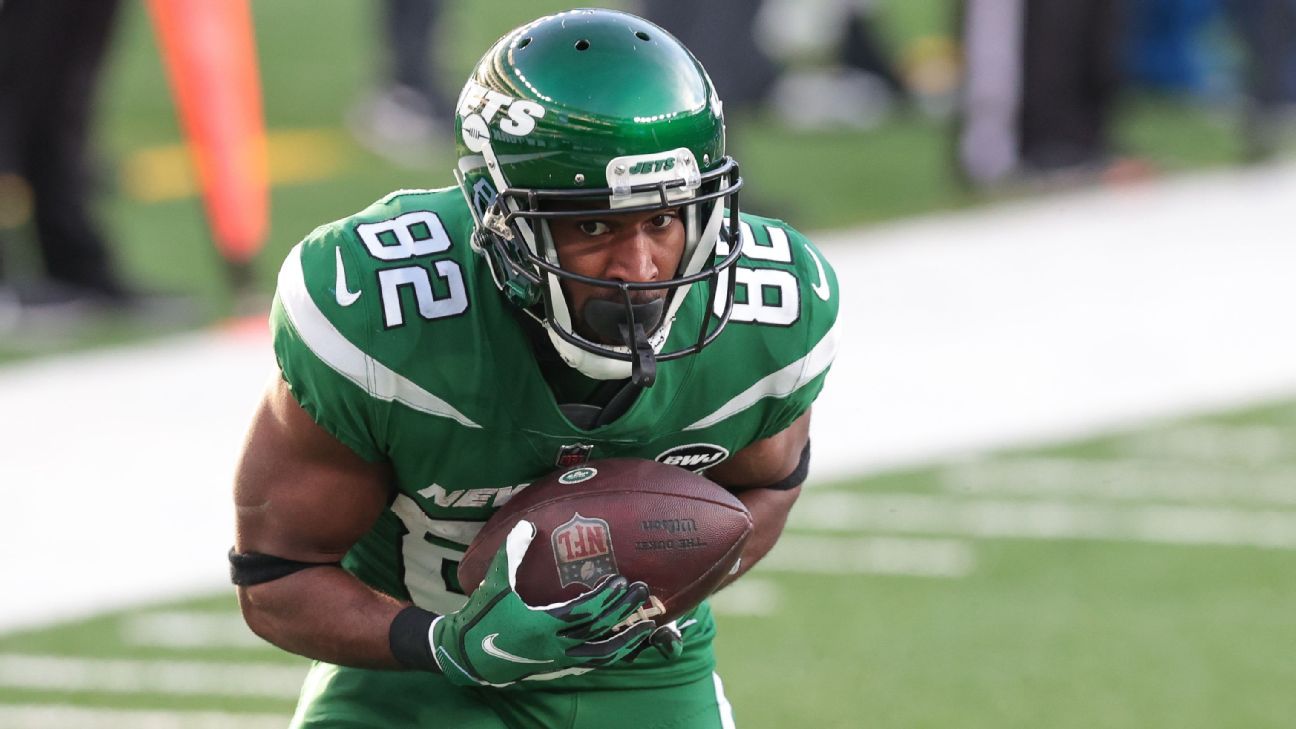FLORHAM PARK, N.J. — There were times last season when it looked like wide receiver Jamison Crowder was the only good thing about the New York Jets‘ offense. He scored a team-high six touchdowns, twice as many as the next player, and he capped his year by throwing a touchdown in a Week 16 win against the Cleveland Browns.
Now there’s speculation he could be a salary-cap casualty. Yeah, it’s a cold business.
Crowder is vulnerable because his cap charge is a team-high $11.4 million, including a non-guaranteed $10 million in base salary — a high number for a slot receiver. Because it’s the final year of his contract, he’s considered an “easy” cut because his entire base would come off the books. Which raises the question:
Does a team with plenty of cap room (a projected $68 million, per Over The Cap) jettison its most productive offensive skill player just because his cap charge is over market?
In a vacuum, the answer is a no-brainer — keep him — but you don’t build a winning roster by operating that way. Jets general manager Joe Douglas plays hardball when it comes to maintaining a value system, so it wouldn’t be a surprise if he looks to re-invest that $10 million.
Douglas could try to upgrade at slot receiver with JuJu Smith-Schuster (Pittsburgh Steelers) or Chris Godwin (Tampa Bay Buccaneers) in 2021 NFL free agency; that would cost serious money. He also could opt for a cheaper option, Kendrick Bourne (San Francisco 49ers), who spent the past four years in the system the Jets are planning to install. There’s also the possibility of re-negotiating Crowder’s contract.
Crowder, who turns 28 on June 17, ranked seventh in receptions (91) and eighth in yards (1,094) on plays from the slot position over the past two seasons, according to ESPN Stats & Information. That’s pretty good production for a player who missed four games in 2020 because of soft-tissue injuries and dealt with inconsistency at the quarterback position. Former Jets coach Adam Gase remarked on numerous occasions Crowder was their best player on offense.
All told, Crowder finished with 59 catches for 699 yards — both team highs in 2020, but pedestrian numbers when viewed through a wider lens.
In a bottom-line sense, Crowder’s numbers aren’t commensurate with his pay. He has the third-highest cap charge among receivers who played at least 50% of their downs from the slot over the past two years, behind the Cleveland Browns‘ Jarvis Landry ($14.8 million) and the Seattle Seahawks‘ Tyler Lockett ($13.4 million). Full disclosure: Landry’s time in the slot was 49.5%, per ESPN Stats & Info.
The downside to cutting Crowder is it would leave the Jets with no proven players at receiver, just promising, second-year player Denzel Mims, backup slot receiver Braxton Berrios and a bunch of question marks. Berrios had a sneaky efficient season, catching 37 passes despite playing 290 snaps — a better ratio than Crowder (59 catches in 590 snaps).
Crowder would provide personnel continuity through the transition to an offense under coach Robert Saleh, but that probably won’t weigh heavily in the decision. This is a new coaching staff with a new offensive system — a total re-boot — and it will look to bring in its own players. And you can bet there will be a significant acquisition at wide receiver, whether it’s through free agency or the draft.
Another factor to consider is the role of the slot receiver in coordinator Mike LaFleur’s offense. For insight, let’s look at San Francisco, where he spent the past four years working under coach Kyle Shanahan. From 2017 to 2020, the 49ers’ wide receivers caught 258 passes out of the slot (29th), according to ESPN Stats & Info. The ranking is a bit skewed because the Niners got a lot of slot production from star tight end George Kittle. It’s also worth noting slot receiver Emmanuel Sanders was a key piece during San Francisco’s Super Bowl run in 2019.
Good coaches find ways to use good players, and Crowder is a good player. Now they have to decide if he’s good enough to pay $10 million.
